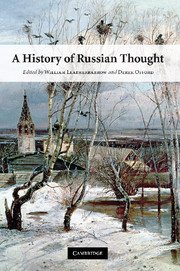Book contents
- Frontmatter
- Contents
- Preface
- List of contributors
- Dates, transliteration and other conventions
- Dates of reigns
- Russian titles of journals, newspapers and miscellanies
- PART I CONTEXT
- PART II INTELLECTUAL CURRENTS
- PART III THEMES AND CONSTRUCTS
- 9 The West
- 10 The East
- 11 The people
- 12 The intelligentsia and capitalism
- 13 Natural science
- PART IV THE AFTERLIFE OF CLASSICAL THOUGHT
- Biographical details of thinkers and writers
- Selected bibliography
- Index
13 - Natural science
Published online by Cambridge University Press: 05 June 2012
- Frontmatter
- Contents
- Preface
- List of contributors
- Dates, transliteration and other conventions
- Dates of reigns
- Russian titles of journals, newspapers and miscellanies
- PART I CONTEXT
- PART II INTELLECTUAL CURRENTS
- PART III THEMES AND CONSTRUCTS
- 9 The West
- 10 The East
- 11 The people
- 12 The intelligentsia and capitalism
- 13 Natural science
- PART IV THE AFTERLIFE OF CLASSICAL THOUGHT
- Biographical details of thinkers and writers
- Selected bibliography
- Index
Summary
‘Not one Russian has appeared, whose name deserves to be recorded in the history of the Arts and the Sciences.’ So writes the explorer and astronomer the abbé Jean-Baptiste Chappe d'Auteroche in the course of his lengthy and arduous journey from Paris via St Petersburg to Tobolsk in Siberia, which he had undertaken at the invitation of the St Petersburg Academy of Sciences in order to observe the 1761 transit of Venus. With no shortage of time on his hands during his overland journey, Chappe had ample opportunity to compile a travelogue that describes the vast Russian hinterland beyond St Petersburg in which the local population subsists in conditions of unimaginable poverty and privation through the nine-month Siberian winter, a wretched condition exacerbated by the near-slavery to which despotism and serfdom have reduced it. This leads Chappe to one of the explanations he offers in his travelogue for the underperformance of Russian science up to the mid-eighteenth century: ‘Despotism debases the mind, damps the genius and stifles every kind of sentiment.’ Chappe regards the constitution of the eighteenth-century Russian state as being inimical to the spirit of independent thought in general, and of progressive scientific enquiry in particular.
If an index of a country's scientific achievement may reasonably be drawn from the recognition accorded its scientists by scientific institutions and writers elsewhere in the wider world scientific community, then Chappe's initial contention can be granted, for at the time of his writing the international recognition of Russia's contribution to world science was indeed very low.
- Type
- Chapter
- Information
- A History of Russian Thought , pp. 286 - 308Publisher: Cambridge University PressPrint publication year: 2010
- 1
- Cited by

